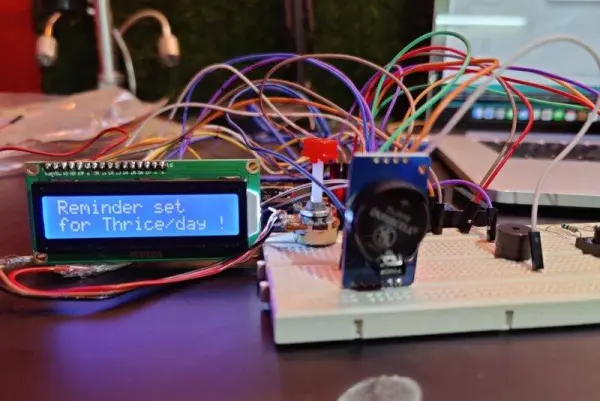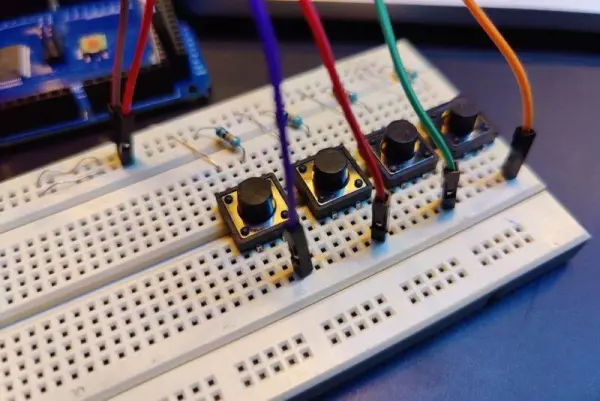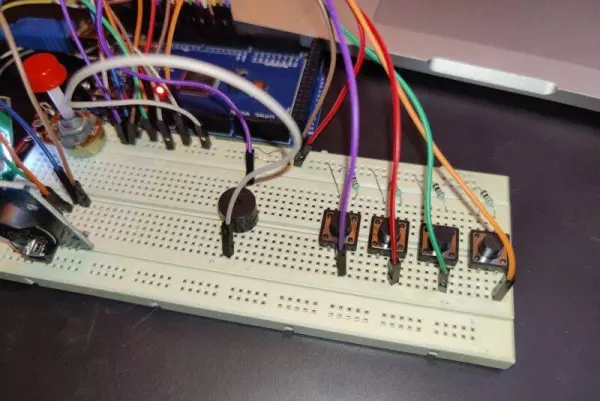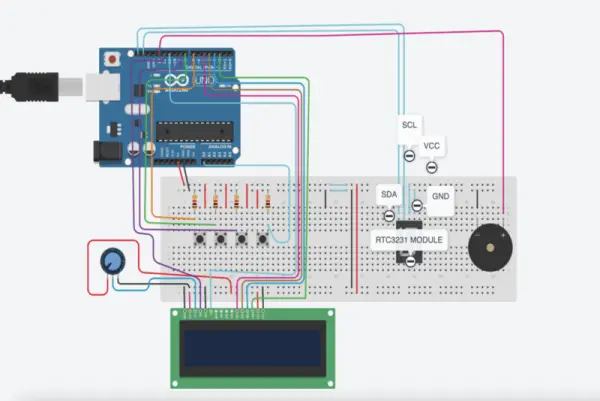Greetings everyone, welcome back to Techatronic. In this latest article, we’re presenting a highly beneficial project known as the Medicine Reminder. This particular creation aims to assist individuals who require medication. Essentially, it comprises a box equipped with multiple drawers, three of which have the capability to open and close.

In today’s world, many individuals have essential medications that must be taken at specific times, making timely consumption crucial. To address this need, we’ve developed an exceptional Medicine Reminder project utilizing Arduino. Once the medicine schedule is set, this innovative system automatically prompts medication reminders by opening and closing designated drawers, accompanied by an audible buzzer signal.
Introduction
The medication reminder project holds significant importance for patients requiring consistent and timely intake of prescribed medicines. Our Automatic Medicine Reminder utilizing Arduino functions akin to an alarm system, displaying the specific medicine names. Often, we tend to forget medication, which can be detrimental for certain medical conditions. Hence, this project serves as a valuable aid in such scenarios.
The Medicine Reminder features an LCD screen that exhibits the medicine names scheduled for consumption at designated times.
Upon system activation, it prompts the user to configure medicine reminders, allowing for three set times: once, twice, or thrice a day, with the option to add more through the code. Using four buttons, the user sets the timing for each reminder. Upon setting the times, the clock initiates, continually comparing the current time with the user-entered data to trigger reminders accordingly.
We’ll provide a detailed guide comprising all the necessary steps to create this medicine reminder project. It’s essential to follow each step diligently to successfully complete this project. Additionally, we recommend referring to specific articles to gain a foundational understanding of Arduino and how to establish connections between an RTC and Arduino before initiating this project.
Construction
During the construction phase, understanding the project flow is essential. Initially, we’ll compile a list of necessary components.
Material Required for Medicine Reminder

- Arduino Mega
This serves as a microcontroller development board, functioning as the central controller in this project. If you seek information about Arduino, you can refer to the article available on our website.
- RTC3231 Module
The RTC3231 is a real-time clock system built around a chip known as rtc3231. Equipped with a coin battery, it consistently provides power to the module, allowing it to retain the set time consistently.
- 4- push button
Push buttons represent some of the most commonly used switches that establish or interrupt a circuit when pressed.
- jumper wires
they use to make the connection over the breadboard
- buzzer
It makes noise whenever we power it. basically, it converts electrical energy into sound energy.
- 16×2 LCD display
16×2 displays are common uses in the project there are 16 columns and 2 rows that’s why it is known as 16×2 LCD.
- Breadboard
if you want to learn

Circuit Diagram for Medicine Alarm:-

Code For medicine reminder project
//Medicine Reminder using Arduino Uno
// Reminds to take medicine at 8am, 2pm, 8pm
/* The circuit:
LCD RS pin to digital pin 12
LCD Enable pin to digital pin 11
LCD D4 pin to digital pin 5
LCD D5 pin to digital pin 4
LCD D6 pin to digital pin 3
LCD D7 pin to digital pin 2
LCD R/W pin to ground
LCD VSS pin to ground
LCD VCC pin to 5V
10K resistor:
ends to +5V and ground
wiper to LCD VO pin (pin 3)*/
#include
#include
#include
#include
int pushVal = 0;
int val;
int val2;
int addr = 0;
RTC_DS3231 rtc;
const int rs = 12, en = 11, d4 = 5, d5 = 4, d6 = 3, d7 = 2; // lcd pins
LiquidCrystal lcd(rs, en, d4, d5, d6, d7);
#define getWellsoon 0
#define HELP_SCREEN 1
#define TIME_SCREEN 2
//bool pushPressed; //flag to keep track of push button state
int pushpressed = 0;
const int ledPin = 13; // buzzer and led pin
int ledState = LOW;
int Signal = 0;
int buzz = 13;
int push1state, push2state, push3state, stopinState = 0; //
int push1Flag, push2Flag, Push3Flag = false; // push button flags
int push1pin = 9;
int push2pin = 8;
int push3pin = 7;
int stopPin = A0;
int screens = 0; // screen to show
int maxScreen = 2; // screen count
bool isScreenChanged = true;
long previousMillis = 0;
long interval = 500; // buzzing interval
unsigned long currentMillis;
long previousMillisLCD = 0; // for LCD screen update
long intervalLCD = 2000; // Screen cycling interval
unsigned long currentMillisLCD;
// Set Reminder Change Time
int buzz8amHH = 8; // HH – hours ##Set these for reminder time in 24hr Format
int buzz8amMM = 00; // MM – Minute
int buzz8amSS = 00; // SS – Seconds
int buzz2pmHH = 14; // HH – hours
int buzz2pmMM = 00; // MM – Minute
int buzz2pmSS = 00; // SS – Seconds
int buzz8pmHH = 20; // HH – hours
int buzz8pmMM = 00; // MM – Minute
int buzz8pmSS = 00; // SS – Seconds
int nowHr, nowMin, nowSec; // to show current mm,hh,ss
// All messeges
void gwsMessege(){ // print get well soon messege
lcd.clear();
lcd.setCursor(0, 0);
lcd.print(“Stay Healthy :)”); // Give some cheers
lcd.setCursor(0, 1);
lcd.print(“Get Well Soon :)”); // wish
}
void helpScreen() { // function to display 1st screen in LCD
lcd.clear();
lcd.setCursor(0, 0);
lcd.print(“Press Buttons”);
lcd.setCursor(0, 1);
lcd.print(“for Reminder…!”);
}
void timeScreen() { // function to display Date and time in LCD screen
DateTime now = rtc.now(); // take rtc time and print in display
lcd.clear();
lcd.setCursor(0, 0);
lcd.print(“Time:”);
lcd.setCursor(6, 0);
lcd.print(nowHr = now.hour(), DEC);
lcd.print(“:”);
lcd.print(nowMin = now.minute(), DEC);
lcd.print(“:”);
lcd.print(nowSec = now.second(), DEC);
lcd.setCursor(0, 1);
lcd.print(“Date: “);
lcd.print(now.day(), DEC);
lcd.print(“/”);
lcd.print(now.month(), DEC);
lcd.print(“/”);
lcd.print(now.year(), DEC);
}
void setup() {
Serial.begin(9600); // start serial debugging
if (! rtc.begin()) { // check if rtc is connected
Serial.println(“Couldn’t find RTC”);
while (1);
}
if (rtc.lostPower()) {
Serial.println(“RTC lost power, lets set the time!”);
}
// rtc.adjust(DateTime(F(__DATE__), F(__TIME__))); // uncomment this to set the current time and then comment in next upload when u set the time
rtc.adjust(DateTime(2019, 1, 10, 7, 59, 30)); // manual time set
lcd.begin(16, 2);
lcd.clear();
lcd.setCursor(0, 0);
lcd.print(“Welcome To”); // print a messege at startup
lcd.setCursor(0, 1);
lcd.print(“Circuit Digest”);
delay(1000);
pinMode(push1pin, INPUT_PULLUP); // define push button pins type
pinMode(push2pin, INPUT_PULLUP);
pinMode(push3pin, INPUT_PULLUP);
pinMode(stopPin, INPUT_PULLUP);
pinMode(ledPin, OUTPUT);
delay(200);
Serial.println(EEPROM.read(addr));
val2 = EEPROM.read(addr); // read previosuly saved value of push button to start from where it was left previously
switch (val2) {
case 1:
Serial.println(“Set for 1/day”);
push1state = 1;
push2state = 0;
push3state = 0;
pushVal = 1;
break;
case 2:
Serial.println(“Set for 2/day”);
push1state = 0;
push2state = 1;
push3state = 0;
pushVal = 2;
break;
case 3:
Serial.println(“Set for 3/day”);
push1state = 0;
push2state = 0;
push3state = 1;
pushVal = 3;
break;
}
}
void loop() {
push1(); //call to set once/day
push2(); //call to set twice/day
push3(); //call to set thrice/day
if (pushVal == 1) { // if push button 1 pressed then remind at 8am
at8am(); //function to start uzzing at 8am
}
else if (pushVal == 2) { // if push button 2 pressed then remind at 8am and 8pm
at8am();
at8pm(); //function to start uzzing at 8mm
}
else if (pushVal == 3) { // if push button 3 pressed then remind at 8am and 8pm
at8am();
at2pm(); //function to start uzzing at 8mm
at8pm();
}
currentMillisLCD = millis(); // start millis for LCD screen switching at defined interval of time
push1state = digitalRead(push1pin); // start reading all push button pins
push2state = digitalRead(push2pin);
push3state = digitalRead(push3pin);
stopinState = digitalRead(stopPin);
stopPins(); // call to stop buzzing
changeScreen(); // screen cycle function
}
// push buttons
void push1() { // function to set reminder once/day
if (push1state == 1) {
push1state = 0;
push2state = 0;
push3state = 0;
// pushPressed = true;
EEPROM.write(addr, 1);
Serial.print(“Push1 Written : “); Serial.println(EEPROM.read(addr)); // for debugging
pushVal = 1; //save the state of push button-1
lcd.clear();
lcd.setCursor(0, 0);
lcd.print(“Reminder set “);
lcd.setCursor(0, 1);
lcd.print(“for Once/day !”);
delay(1200);
lcd.clear();
}
}
void push2() { //function to set reminder twice/day
if (push2state == 1) {
push2state = 0;
push1state = 0;
push3state = 0;
// pushPressed = true;
EEPROM.write(addr, 2);
Serial.print(“Push2 Written : “); Serial.println(EEPROM.read(addr));
pushVal = 2;
lcd.clear();
lcd.setCursor(0, 0);
lcd.print(“Reminder set “);
lcd.setCursor(0, 1);
lcd.print(“for Twice/day !”);
delay(1200);
lcd.clear();
}
}
void push3() { //function to set reminder thrice/day
if (push3state == 1) {
push3state = 0;
push1state = 0;
push2state = 0;
// pushPressed = true;
EEPROM.write(addr, 3);
Serial.print(“Push3 Written : “); Serial.println(EEPROM.read(addr));
pushVal = 3;
lcd.clear();
lcd.setCursor(0, 0);
lcd.print(“Reminder set “);
lcd.setCursor(0, 1);
lcd.print(“for Thrice/day !”);
delay(1200);
lcd.clear();
}
}
void stopPins() { //function to stop buzzing when user pushes stop push button
if (stopinState == 1) {
// stopinState = 0;
// pushPressed = true;
pushpressed = 1;
lcd.clear();
lcd.setCursor(0, 0);
lcd.print(“Take Medicine “);
lcd.setCursor(0, 1);
lcd.print(“with Warm Water”);
delay(1200);
lcd.clear();
}
}
void startBuzz() { // function to start buzzing when time reaches to defined interval
// if (pushPressed == false) {
if (pushpressed == 0) {
Serial.println(“pushpressed is false in blink”);
unsigned long currentMillis = millis();
if (currentMillis – previousMillis >= interval) {
previousMillis = currentMillis; // save the last time you blinked the LED
Serial.println(“Start Buzzing”);
if (ledState == LOW) { // if the LED is off turn it on and vice-versa:
ledState = HIGH;
} else {
ledState = LOW;
}
digitalWrite(ledPin, ledState);
}
}
else if (pushpressed == 1) {
Serial.println(“pushpressed is true”);
ledState = LOW;
digitalWrite(ledPin, ledState);
}
}
void at8am() { // function to start buzzing at 8am
DateTime now = rtc.now();
if (int(now.hour()) >= buzz8amHH) {
if (int(now.minute()) >= buzz8amMM) {
if (int(now.second()) > buzz8amSS) {
/////////////////////////////////////////////////////
startBuzz();
/////////////////////////////////////////////////////
}
}
}
}
void at2pm() { // function to start buzzing at 2pm
DateTime now = rtc.now();
if (int(now.hour()) >= buzz2pmHH) {
if (int(now.minute()) >= buzz2pmMM) {
if (int(now.second()) > buzz2pmSS) {
///////////////////////////////////////////////////
startBuzz();
//////////////////////////////////////////////////
}
}
}
}
void at8pm() { // function to start buzzing at 8pm
DateTime now = rtc.now();
if (int(now.hour()) >= buzz8pmHH) {
if (int(now.minute()) >= buzz8pmMM) {
if (int(now.second()) > buzz8pmSS) {
/////////////////////////////////////////////////////
startBuzz();
/////////////////////////////////////////////////////
}
}
}
}
//Screen Cycling
void changeScreen() { //function for Screen Cycling
// Start switching screen every defined intervalLCD
if (currentMillisLCD – previousMillisLCD > intervalLCD) // save the last time you changed the display
{
previousMillisLCD = currentMillisLCD;
screens++;
if (screens > maxScreen) {
screens = 0; // all screens over -> start from 1st
}
isScreenChanged = true;
}
// Start displaying current screen
if (isScreenChanged) // only update the screen if the screen is changed.
{
isScreenChanged = false; // reset for next iteration
switch (screens)
{
case getWellsoon:
gwsMessege(); // get well soon message
break;
case HELP_SCREEN:
helpScreen(); // instruction screen
break;
case TIME_SCREEN:
timeScreen(); // to print date and time
break;
default:
//NOT SET.
break;
}
}
}
